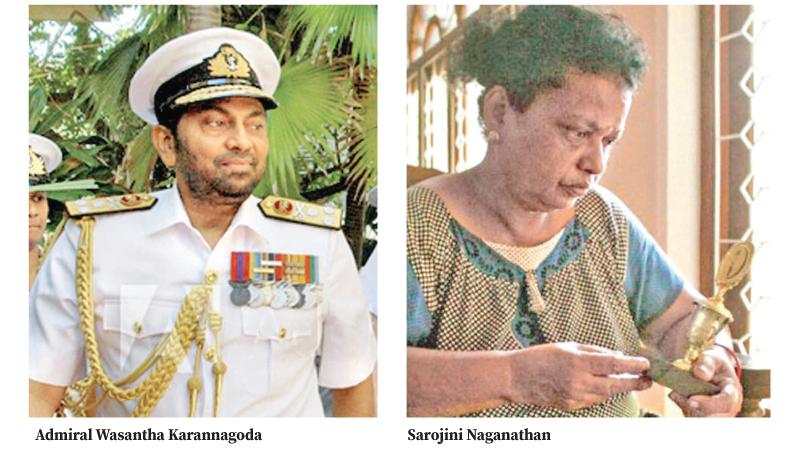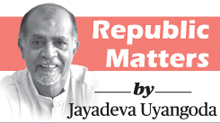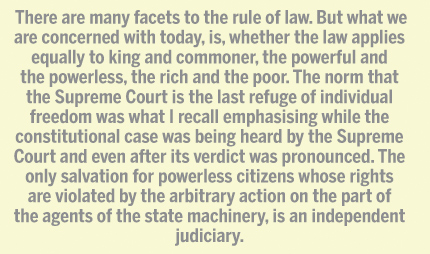
The controversy over whether the former Navy Commander Admiral Wasantha Karannagoda would be arrested captured public attention last week.
 The saga has left the citizen concerned about the independence of the judiciary, and its responsibility to protect powerless and helpless citizens when their rights are repeatedly violated. It also highlighted the need to emphasize the court’s obligation to safeguard the principle of equality before the law.
The saga has left the citizen concerned about the independence of the judiciary, and its responsibility to protect powerless and helpless citizens when their rights are repeatedly violated. It also highlighted the need to emphasize the court’s obligation to safeguard the principle of equality before the law.
The issue of Karannagoda’s arrest is centred on the abduction of 11 Tamil - speaking youth and their alleged subsequent murder, suspected to be carried out by a group of Sri Lanka Navy personnel during the war.
Investigations carried out by the CID have revealed that the alleged abduction and murder of these Tamil youth was part of an organised ransom racket.
It is to this investigation that the former Navy Commander’s name is now linked.
The media has revealed that according to the CID reports submitted to the court, the former Navy Commander had been aware of this abduction – for - ransom racket, but had done nothing to prevent it. There were also suggestions that if he had intervened, the lives of these eleven young boys could have been saved.
The Attorney General was preparing to file indictments against him in the High Court as a suspect in this case.
Abduction, enforced disappearance and murder are indeed grave crimes. Police arrest of suspects involved in such crimes is a routine course of action.
 When the law and justice operate impartially, persons are arrested and placed in remand over far less serious offences. It was only last week that the JVP’s LalKantha reminded us that a driver may be arrested and remanded over the suspicion of driving a vehicle under the influence of alcohol and causing injury to others.
When the law and justice operate impartially, persons are arrested and placed in remand over far less serious offences. It was only last week that the JVP’s LalKantha reminded us that a driver may be arrested and remanded over the suspicion of driving a vehicle under the influence of alcohol and causing injury to others.
Last week was also the week when citizens learned that a person charged with a far graver crime could be granted protection from arrest by the Supreme Court. Admiral Karannagoda sought a judicial order preventing his arrest and the request was granted by the Court. Media reports said that the Additional Solicitor General representing the State and the Attorney General had told court that the AG was not insisting on Karannagoda’s arrest.
Former Defence Secretary Gotabaya Rajapaksa against whom there were serious charges has also been fortunate enough to invoke a judicial order to prevent his arrest. The former Navy Commander and current Chief of Defence Staff also enjoyed this privilege to some extent. The latter was remanded for a few days and subsequently enlarged on bail.
Last week, the Sunday Observer published a report about the effect of Karannagoda incident and the Supreme Court ruling not to arrest him, on the minds of the citizenry. Two days later, a website followed up the story. According to these reports, both the executive and the Attorney General’s Department are directly linked to the violation of the law’s most basic principle – equality before the law.
If these reports are true, the time has indeed come for Sri Lankan citizens to revive the conversation about Sri Lanka’s judiciary and citizen’s rights. At a time when Sri Lanka’s democracy is in peril, the independence of the judiciary – particularly, the Supreme Court – and the need to protect the institutional independence of the Attorney General’s Department are integrally connected with the broader struggle to safeguard democracy and freedom of the citizens. The lenient treatment shown to powerful persons such as Gotabaya Rajapaksa, Ravindra Wijegunaratne and Wasantha Karannagoda by the courts points to three things:
Firstly, there is concern about whether the courts have adopted a tradition of applying the basic precepts of law more leniently to the powerful. Secondly, whether the court’s institutional responsibility to protect victims and its determination to ensure that the law does not bend to the powerful seems to be growing weaker. And thirdly, the question arises whether victims become re-victimized before the eyes of the justices themselves when they seek justice against the powerful.
By raising these issues, I have no intention whatsoever to cast aspersions on the capacity of Sri Lanka’s judiciary in its role as the final source of justice in our society which is full of injustice.
I have publicly commended the Supreme Court for its independence and integrity when it pronounced its unanimous verdict during the constitutional crisis last year.
I raise these questions now because the issue of judicial commitment to impartiality in justice directly relates to a legal principle that the December 2018 court verdict makes reference to. The judgment, that most people believe was written by Chief Justice Nalin Perera, repeatedly reiterates and reinforces that the rule of law is the fundamental normative doctrine on which the entire edifice of our Constitution is built.
Equality before the law is a cardinal principle in the doctrine of rule of law. It ensures that the law applies equally to every one, without fear or favour, with no distinction made between the king and the pauper, the haves and havenots, or the powerful and the powerless.
The only salvation for powerless citizens whose rights are violated by arbitrary action on the part of powerful and arrogant agents of the state, is a fiercely independent judiciary which is also acutely sensitive to how the powerful has access to all the means to subvert justice in the name of law and justice.
When the court itself appears to relax its bounden and crucial duty to protect the powerless, it causes a great deal of anxiety about justice as well as the Justices. That I believe is a legitimate topic for public discussion without much anxiety about any penal repercussions.
The judicial privilege and relief extended to Gotabaya Rajapaksa and Wasantha Karannagoda feeds these anxieties about justice in Sri Lanka today. They were able to obtain these orders not merely on the strength of wealth and legal resources at their disposal. As media reports have repeatedly highlighted during the past few years, they also enjoy the benefits of networks of protection that operate within the state structure. Those networks link the most powerful in the political structure, top operatives in the business world, and some officials in the law enforcement apparatus. These networks constitute a new coalition of the powerful to manipulate the process of justice for personal and political gain. This matter of how the powerless gets justice denied against a formidable coalition of the powerful came most tragically to light when Karannagoda’s case was taken up for hearing by the Supreme Court last Friday, as reported in the Sunday Observer last week. A party to this case was one Mrs. Sarojini Naganathan, the mother of a youth allegedly abducted by a group of naval personnel. The other party is admiral Karannagoda who appeared to be supported by sections of the powerful business community and sections of the State.
In terms of how much power they wield, these two parties to the case are poles apart. When this imbalance of power played out dramatically in the courtroom, the kind of sensitivity that ought to be displayed by the judges in such a case, is a matter one hopes will be a theme of conscience as well as reflection and discussion among members of the judiciary themselves.
There is another matter which merits the attention of our judiciary. I am sure that all judges from Magistrate’s Courts to the Supreme Court would have observed during the past several years that most mothers, fathers, wives and children who sought relief from the judiciary on matters of human rights violations are poor and less privileged citizens of our nation who have been denied justice by the state itself.
They have been praying for relief from the judiciary because they have failed to receive any from the all-powerful Executive and the Legislature for years or decades.
The fact that our state entities have deliberately prevented any relief being given to them is an open secret. That is precisely why the present Sri Lankan Government tried, during the first two years in office at least, to convince those victimized sections of the citizens that now they have got a law enforcement and judicial process that is no longer insensitive to their being denied justice. Despite such assurances, we have also been seeing how coming to courts seeking justice has become an experience of re-victimization of victims.
Then, in a real sense, for the families of victims, coming before the courts for redress is no more than another trauma, played out in public.
Shouldn’t the cases relating to the assassination of Lasantha Wickrematunge, disappearance and murder of Prageeth Ekneligoda, the abduction of 11 youth among whom is Mrs Naganathan’s son, be topics of discussion and reflection among judges themselves? I think they should, because the question of justice in all these cases has become entangled with political agendas and ambitions of the powerful and those powerful coalitions of the powerful have been seeking to undermine justice. It is no exaggeration to say that Sri Lanka’s system of justice is now facing an entirely new source of threat, because the very issue of justice has been excessively politicised, blurring the distinction between power and justice.
It would be even better if this discussion extends to the circles of eminent President’s Counsels who defend the high and mighty with their legal eloquence.
And perhaps one day, one of those eminent counsel will appear voluntarily even for just half a day, to defend the rights of a single helpless mother against the formidable coalitions of the powerful.
That would be the day when those who live by justice also demonstrate that justice is largely about conscience.
